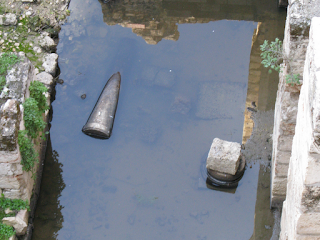< Healing at a distance | Index | The crowds are fed >
Jesus heals a lame man and tells him to pick up his mat and walk. As it's the Sabbath, this leads to trouble with the Jewish leaders. Once again we will ask four questions after reading the passage.
Here is the third sign in John, for the background please read the index page.
Parts of the Pool of Bethesda are still visible in Jerusalem. The archaeology is not straightforward to understand because of the presence of later structures. But remains of the pool are definitely present.
The covered colonnades have long since gone, but they would have provided cool shade where the sick would have waited, hoping that the water would be stirred so that one person might be healed each day.
Some time later, Jesus went up to Jerusalem for one of the Jewish festivals. Now there is in Jerusalem near the Sheep Gate a pool, which in Aramaic is called Bethesda and which is surrounded by five covered colonnades. Here a great number of disabled people used to lie – the blind, the lame, the paralysed. One who was there had been an invalid for thirty-eight years. When Jesus saw him lying there and learned that he had been in this condition for a long time, he asked him, ‘Do you want to get well?’
‘Sir,’ the invalid replied, ‘I have no one to help me into the pool when the water is stirred. While I am trying to get in, someone else goes down ahead of me.’
Then Jesus said to him, ‘Get up! Pick up your mat and walk.’ At once the man was cured; he picked up his mat and walked.
The day on which this took place was a Sabbath, and so the Jewish leaders said to the man who had been healed, ‘It is the Sabbath; the law forbids you to carry your mat.’
But he replied, ‘The man who made me well said to me, “Pick up your mat and walk.”’
So they asked him, ‘Who is this fellow who told you to pick it up and walk?’
The man who was healed had no idea who it was, for Jesus had slipped away into the crowd that was there.
Later Jesus found him at the temple and said to him, ‘See, you are well again. Stop sinning or something worse may happen to you.’ The man went away and told the Jewish leaders that it was Jesus who had made him well.
So, because Jesus was doing these things on the Sabbath, the Jewish leaders began to persecute him. In his defence Jesus said to them, ‘My Father is always at his work to this very day, and I too am working.’
As for the earlier signs in John, I'll now ask the four questions suggested by Neil Cole and provide some pointers for finding the answers in the material quoted above.
What does this story tell us about people? - Let's work through them systematically.
There was a crowd at the Pool of Bethesda - a 'great number' of disabled people lying there. Why were they there? And why so many of them? What were their expectations of success?
Among them is this one particular man. We don't know his name, but Jesus spoke to him. How did he respond to Jesus' question? Why didn't he simply answer 'Yes'? Was he healed as Jesus spoke or as he obeyed? How does he reply to the Jewish leaders who quiz him after he is healed? And later, after he meets Jesus again in the Temple, why might he have gone back to the Jewish leaders?
Next we must consider the Jewish leaders themselves. Are they glad to hear about the healing? Whose interests do they have at heart? What motives underlie their question to the healed man? What was their attitude to Jesus?
What does it tell us about Jesus? - Why was Jesus in Jerusalem, what does this tell us about his attitude to Jewish traditions?
He also went to a place where there were many sick people. Is he willing or unwilling to deal with the pain and misery that people sometimes face? Did he heal everyone, if not how many?
What is his view on rules like working on the Sabbath? Are there things that he sees as more important? If so, what? How did he explain his attitude to the Sabbath regulations?
What does it tell me about myself? - Are there any ways in which you are a bit like the characters portrayed here?
Who else needs to hear this? - Do you know anyone who might be encouraged by this story? Do you know anyone who needs healing? Do you know anyone with strong religious attitudes about following rules and regulations? If you know people who need to hear this story, who will tell them? Might you need to tell them?
Additional points - Jewish law was quite strict. Picking something up and carrying it counted as work and was not allowed on the Sabbath.
< Healing at a distance | Index | The crowds are fed >







